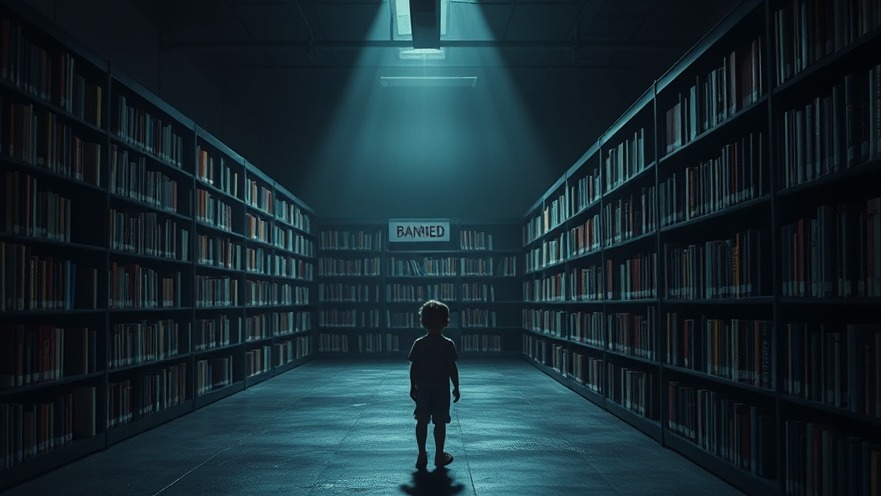
Unveiling the Hidden War on Books in Georgia Schools
As we approach Banned Book Week from October 5-11, it becomes increasingly important to recognize the alarming trend of book bans across the United States, particularly in Georgia. Recent data from PEN America shows that an astounding 22,810 books have been banned since 2021. While Georgia may not top the list like Florida or Texas, the state has its fair share of public schools and libraries experiencing censorship pressures capable of restricting a diverse range of literature.
The Silent Surge of Censorship
Tasslyn Magnusson, a senior advisor with PEN America, highlights the strategies employed by local parental rights groups to enforce what they call “soft” censorship. Instead of navigating the public challenges typical of overt book bans, these groups tend to remove books quietly, leaving parents unaware and libraries silently crippled. According to Magnusson, these innovative approaches make censorship feel less controversial, despite the clear impact on students' access to literature.
Georgia's Schools and the Controversial Choice of Censorship
Georgia’s battle against book bans took a sharp turn in 2022 when several counties, such as Forsyth, restricted books related to race, gender, and sexual orientation, following multiple civil rights complaints. In mid-2023, Marietta City Schools officially banned 25 titles, inciting community conflict as the district faced accusations of continuing to implement soft censorship behind closed doors.
It's noteworthy that Cobb County Schools, with a tally reaching 36, stands as the most censored district in the state, employing vague language to disguise its actions. The ban-happy administration appears intent on regulating educational materials similarly to how movies are rated. This slippery slope creates an environment ripe for censorship that stifles important discourse on topics ranging from identity to social justice.
The Increasingly Common Tactic: Flooding Challenges
Another concerning trend is the coordinated effort by some activists to challenge books en masse. Laurel Snyder, an active member of Authors Against Book Bans, points out that a small group of individuals can significantly inflame a community’s sense of urgency regarding alleged indoctrination through the sheer volume of challenges made at once. This tactical intimidation pressures schools into compliance, all while neglecting the voices of countless supporters of those very books.
Such a flood of challenges can distract school boards from their core mission and turn the narrative into one rife with unfounded accusations, like “grooming.” The reality is that the act of reading diverse literature serves as an essential tool for fostering empathy and understanding—a lesson that is particularly crucial in today’s divided climate.
Legislative Struggles: The Threatened Role of Librarians
The fight against book bans is compounded by legislative efforts pushing bills like SB 74, which could criminalize librarians if they distribute materials labeled as obscene—terms that remain ambiguous and subjective. The implications of such laws can create an environment where librarians are forced to self-censor, leaving students without guidance or access to the literature that challenges their perspectives.
While these laws face opposition, they reflect a discouraging trend—one where curtailing access to knowledge creates barriers that affect educational growth in Georgia. A librarian’s perspective reveals that the freedom to curate library collections is under a siege that threatens to erase vital discussions from school libraries.
Grassroots Movements and Hope for Change
Despite the uphill battle, Magnusson is optimistic about the emergence of anticensorship movements that are gaining traction. Groups like “Marietta in the Middle” and the “Freedom to Read Coalition of Columbia County” have united to resist the trend of book bans. This coalition of parents, educators, and advocates fosters not only resilience but also serve as a reminder to those who wish to uphold the value of libraries as inclusive spaces.
As Snyder articulately states, “You might think you’re on one side of this issue and then realize you don’t want to lose your library.” It’s this community resonance that may ignite change—a key reminder that literature serves as both a window and a mirror for students of all identities.
Creating a Culture of Literacy
At its core, pushing back against censorship isn’t just about resisting policies; it’s about fostering a culture of literacy. This culture can be cultivated through recognizing the fundamental role libraries play. Librarian risks, like those faced by Lavonnia Moore, demonstrate that the battle can sometimes feel personal, but the broader stakes are about ensuring every student has access to perspectives as varied as their backgrounds.
As we look toward a future of changing laws and community conversations, it’s vital for citizens of Georgia, and indeed all of America, to engage directly with their local institutions to protect the vibrancy of literature. The freedom to read should never be taken for granted. Now is the time to amplify these voices, support library initiatives, and ensure that classrooms remain spaces for healthy discourse.
A Call to Action: Stand Up for Our Libraries and Books
As advocates for free access to literature, we should rally behind our libraries and issue calls against censorship. Whether you're a parent, teacher, or community member, your voice matters. Get involved with local library boards or support organizations fighting against censorship to make sure every child can access the stories that shape their futures. Together, we can push back against the tide of censorship and foster a rich culture of reading.
 Add Row
Add Row  Add
Add 




Write A Comment